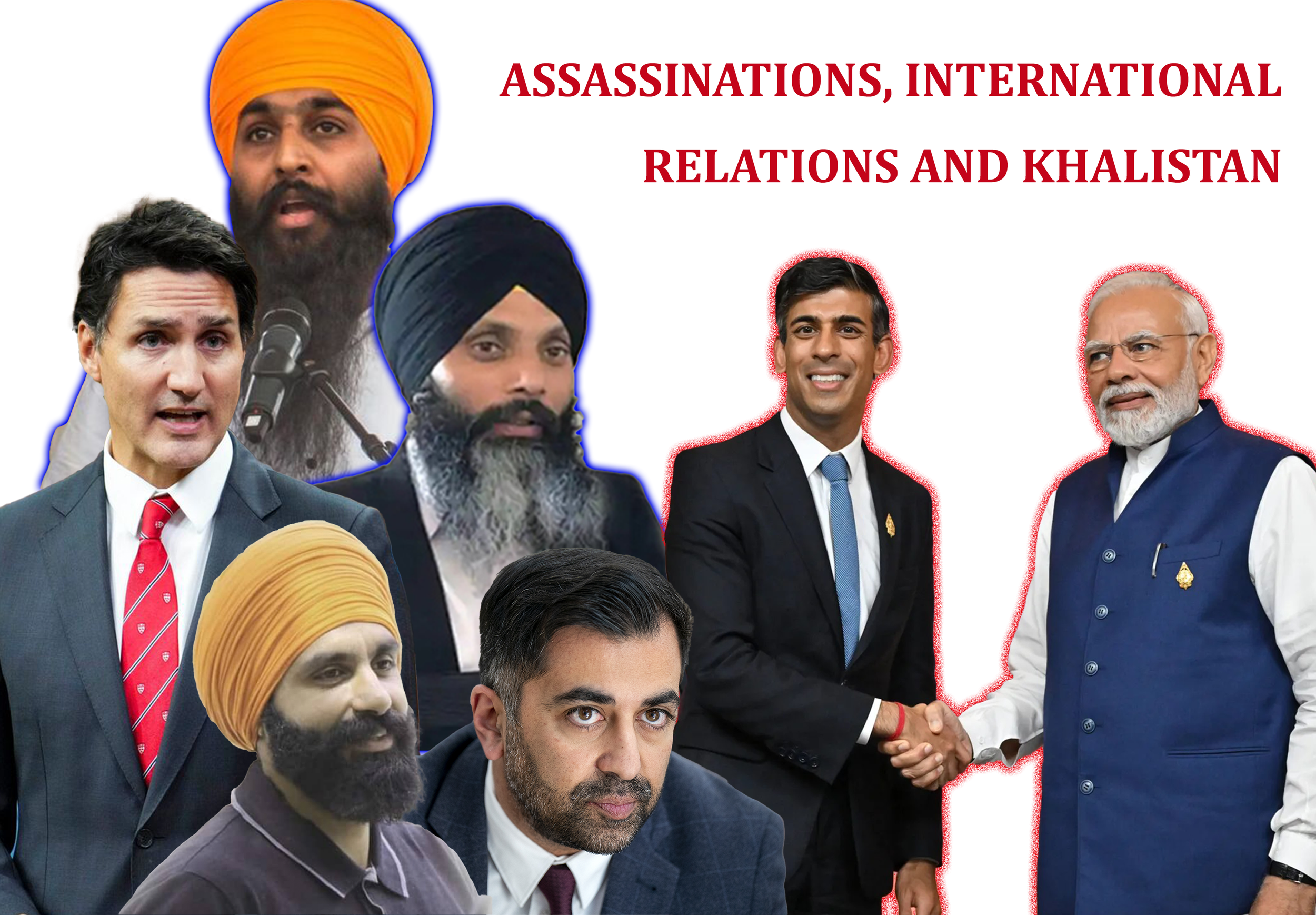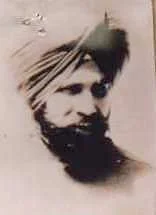ਅਨੋਖ (Anōkh) - extraordinary, uncommon, rare, singular, wonderful.
/“When sheep are beaten they bow their necks in retreat, when lions are beaten they answer back in attack.”
- Shaheed Bhai Anokh Singh Ji Babbar
shaheed bhai anokh singh ji, right, at sri darbar sahib
Today we celebrate the Shaheedi of Bhai Anokh Singh Ji Babbar, a giant of Sikh history and a pillar of the Khalistan struggle. Bhai Sahib decimated the nirankaris that were responsible for the Vasikahi 1978 massacre, they were one of the most deadly assassins for the Babbar Khalsa, they fought in the Battle of Amritsar, and later continued the resistance movement for Khalistan. Bhai Sahib brought to life the Sikhi that we've only read about in stories and demonstrated to those that seek to destroy the Guru Khalsa Panth that Sidhki Sikhs will always be born into the houses of the Panth Khalsa.
Bhai Anokh Singh Ji was known amongst all Jathebandia as a truly remarkable individual for their deep commitment and love for GurSikhi, this deep love for GurSikhi flourished and was demonstrated in their unwavering dedication to the liberation struggle of the Sikh Quam. Their love was put into practice, and the strength from their True Earnings was reflected in their character throughout their life.
In one such account Bhai Anokh Singh gave his nephew 2 rupees on his birth and when his sister in law laughed and said that “you're supposed to be a big kharku and you give only 2 rupees to your nephew”, Bhai Anokh Singh replied “all we have now is the Panths, I feel bad giving even this much”.
Bhai Anokh Singh was once criticised for travelling far on a cycle to collect a donation from a Sikh, as it didn’t amount to much, Bhai Sahib was told he shouldn’t be doing this as a ‘top Singh’ and the amount wasn’t a lot anyway, Bhai Sahib rebuked the Singhs saying every contribution is satkarjog (should be honoured).
In another account on a visit to Punjab a family took a new leather jacket for Bhai Anokh Singh, when they returned sometime later to visit Bhai Anokh Singh another Singh in Bhai Sahib’s company was wearing the jacket. The Bibi ji that gave the jacket asked “veer ji that jacket was for you to wear”, Bhai Sahib’s response was “do you see any difference between myself and another Sikh, we are one and the same”.
Their character was incredibly humble, very sweet, and soft hearted, they truly felt the pain of the Panth. The account of how Bhai Sahib was tortured is famous within the Panth for the inhuman brutality inflicted by indian security forces, and for the fierce spirit of Bhai Anokh Singh which never broke. One of the criminal indian police that tortured Bhai Anokh Singh recounts how after being brutally tortured, where their eyes were taken out, Bhai Sahib asked for the time so they could do Rehaas Sahib. Even during their final days spent in a police torture chamber their thoughts were for the Chardikala of the Panth, they told other Singhs that were also in the police station that we needed to come together and fight as one if we are to succeeded. After their torture their body was thrown into one of the rivers of Punjab and never recovered. The account of Bhai Sahibs Jeevan and torture is one that should be familiar to all Sikhs, and their story is one that will be told as long as the Panth exists. They will never be forgotten nor erased.
“The greatest gift is not milk, or a son, and the Guru doesn’t give their throne to anyone anymore, they don’t make a saint into Guru. When Guru gave the throne to Sri Guru Granth Sahib Ji, there was a distinct gift that any Sikh could obtain, and that distinct gift, after the Guru, the Sikhs respect so highly, this distinct gift that is with the Guru, is the gift of Shaheedi. Those that receive this gift, they don’t become Guru, but after the Guru they become the most highly respected folk.”
- Shaheed Bhai Jaswant Singh Khalsa
It is because of Sikhs like Shaheed Bhai Anokh Singh, that walked upon the established path of Gursikhi, the Khalistan struggle has enjoyed the blessings of Akal Purakh. This is evident in the fact that even in this day and age we are blessed with Shaheeds that have kept alive the ankh of the Sikh Quam. Where for the vast majority it is difficult to even articulate the conditions of our gulaami - and the alienation from our Pathshahi is so perverse that we accept and normalise the rule of colonisers as authorities above Guru Sahib, and walking on the path of our Shaheeds is seen as unachievable, or something that doesn’t fit with “the times”, these Shaheeds proved that the way of GurSikhi will always flourish.
We are grateful for example of Shaheeds like Bhai Anokh Singh who shatter the illusions of Maya by throwing their bodies upon the machinery of the oppressors and inspire generations with a true representation and golden standard of what it means to be a Sikh. Bhai Anokh Singh would tell their father Bhai Makhan Singh, “Bapoo je, when the Sangat does a road block or surrounds a police station you should go too, if you are hit by a bullet then you will achieve Shaheedi which only comes with great good fortune”.
“the sights of the Khalsa are true and pure, the Khalsa’s eyes have realised that the Sikh nation needs a big change, they have fully understood their history and this is the reason that on the 26th of January 1986, the whole of Sarbat Khalsa was invited to Sri Akaal Takht Sahib and according to the Gurmat tradition an announcement was made that put us on the road to Khalistan. This path is not chosen by militant Singhs alone, it’s given to us by the Sarbat Khalsa, it is our duty to walk on that path and by walking on this path we will be graced with Guru Ji’s blessings.”
- Shaheed Bhai Gurjant Singh Bhudsinghwala
The sacrifice of our Shaheeds for the Sikh people is immense and immeasurable. Like all the Sikh martyrs of the Khalistan Sangarsh, Bhai Anokh Singh destroyed every notion of a comfortable existence to live and die free for his people. Below is the account of Bhai Anokh Singh’s life written by their own hand that shows their character and thinking, Bhai Anokh Singh only wrote their account after their Jathebandie leadership made multiple requests to them.
There is also a poem written by Shaheed Bhai Anokh Singh, that is as relevant today as it was over 30 years ago, the clarity of thinking that these great shaheeds had was framed by their abject rejection of any position in this world short of absolute sovereignty of the Panth Khalsa. Bhai Sahib's life was part of the same ਗੂੰਜ (goonj), the thundering roar reverberating from Dhan Guru Nanak Sahib Ji, that has echoed throughout our history. It can never be silenced, it only grows in intensity until it crashes down on the oppressor and oppressed alike destroying the status quo.
My birth was on the 28th of May 1957 Pind Virhing, Suba Singh, Jilla Amritsar. My father’s name is Sardar Makhan Singh. I have three brothers and I am the third. I studied primary education in my pind, then I studied my matriculation at Khadur Sahib government high school. I spent two years at home going farm work, then I started my studies at Khadur Sahib college which is where I first had Sangat of Singhs and started attending kirtan smagums. Even though my mother and father were already amritdhari, it was the Sangat of Singh which had a profound impact on me. With their support, whilst at college, I took Amrit at an Akhand Kirtani Jatha Samagam in Pakho pind in 1979.
After my BA in 1980 I got employment as a gurdwara inspector for the Shiromani Committee, through which I was able to get Dharshan of many Gurdwaray and also many Gursikhs. With Guru Kirpa before my service as an inspector I had the great good fortune of meeting Jathedar Sukhdev Sigh Babbar, Bhai Sulakhan Singh, Bhai Balwinder Singh, Bhai Sahib Singh, Shaheed Bhai Kulwant Singh. These beloved of the Guru kept me in their Charan (humble company) and I can never repay them in my lifetime, words cannot describe the blessings I received from these beloved of the Guru, Neither do I have the words to describe the rehimatan (kindness) I received from these Gursikhs.
I have no praiseworthy actions or qualities which I can write of. With a pen in my hand I feel embarrassed to admit that even with the amount of time I have spent at the Gurughar, in the Sangat of great Gursikhs, I have not been able to do any Seva. Upon reflection of my jeevani I am tearful, if you ask me the truth there is no one as unpleasant as me in the world.
Oh beloved of the Guru, Guru Khalsa Jio, you are very merciful and compassionate, take pity on me and do an Ardaas for me in the Guru’s charan that I may be kept safe from lust, anger, greed, attachment, and ego, and that I can become committed to the Panth and be instilled with Gursikhi. May I be blessed with a small contribution to Panthic Seva. Oh beloved of the Guru, I plead with you to accept my request, your servant, Anokh Singh.
ਐ ਪੰਥ ਦਰਦੀੳ ਕੁਝ ਸੋਚੋ
Oh ਪੰਥ (panth - Sikh nation) ਦਰਦੀੳ (dardio - those that empathise with the ਦਰਦ (dard - pain, ache, suffering [of the panth]) think somewhat!
ਜਿਹਦਾ ਅਪਣਾ ਕਿਤੇ ਨਾ ਘਰ ਹੁੰਦਾ
Those that don't have their own home anywhere,
ਉਹਦਾ ਨੰਗ ਨਾ ਸਕੇਗਾ ਕੱਜ ਕੋਈ
Their ਨੰਗ (nang - nakedness, destitution, poverty) will not be ਕੱਜ (kaj - covered, wrapped, ie: protected) by anyone else,
ਜਿਊਂਦੇ ਜੀ ਮਰ ਗਈ ਜ਼ਮੀਰ ਜਿਸ ਦੀ
Those who's conscience is dead whilst they themselves are alive,
ਉਹਨ ਛੱਟਣ ਲਈ ਛੱਡੇ ਨਾ ਛੱਜ ਕੋਈ
No one else will leave them with even a ਛੱਜ (chajj - a type of basket) to winnow grain in, [A metaphor for the unworthiness of being alive but having a dead conscience],
ਿਜਹਨੂੰ ਜਿਹਦੇ ਹਰਿਮੰਦਰ ਤੋਂ ਤੋੜ ਦਿੱਤਾ
Those that have [been] broken/disconnected from their Harmandar,
ਉਹਨੂੰ ਮਰਨ ਦਾ ਲੱਭੇ ਨਾ ਪੱਜ ਕੋਈ
They will find no ਪੱਜ (pajj - reason/cause/excuse) to even die,
ਜਿਹੜਾ ਅਣਖ ਦਾ ਬਦਲਾ ਨਹੀ ਲੈ ਸਕਦਾ
Those that cannot take ਬਦਲਾ (badla - retribution, redress, vengeance) for their ਅਣਖ (ankh - sense of honour, self-respect, dignity, nobleness, stature),
ਉਹਦੇ ਜੀਊਣ ਦਾ ਰਹੇ ਨਾ ਹੱਜ ਕੋਈ
Their existence has no ਹੱਜ (hajj - benefit, advantage, good),
ਜਿਸ ਦੀ ਪਤ ਨੂੰ ਪੈ ਜਾਏ ਹੱਥ ਲੋਕੋ
Those who's ਪਤ (patth - honour, glory, greatness, faith/trust in their reputation) has been defiled o'people,
ਉਹਦੀ ਮਿੱਟੀ ਸ਼ਰੀਕ ਵੀ ਰੋਲ ਦਿੰਦੇ
Even their peers will become rivals and contribute insults,
ਭੇਡਾਂ ਕੁੱਟ ਖਾ ਕੇ ਧੌਣਾਂ ਸੁੱਟਦੀਆਂ ਨੇ
When sheep are beaten they bow their necks in retreat,
ਸਿੰਘ ਕੁੱਟ ਖਾ ਕੇ ਹੱਲੇ ਬੋਲ ਦਿੰਦੇ
When lions are beaten they answer back in attack.






